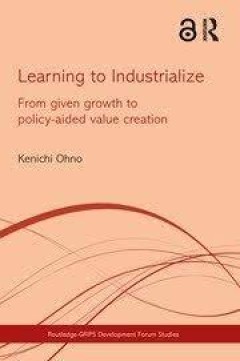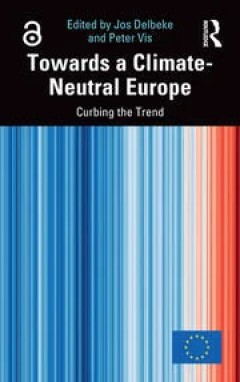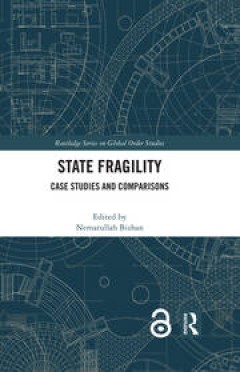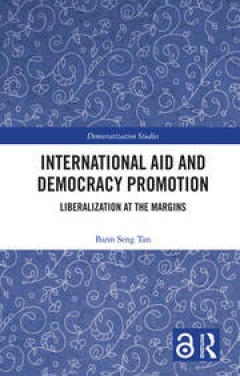Filter by

Learning to Industrialize from Given Growth to Policy-aided Value Creation
This book proposes a new, pragmatic way of approaching economic development which features policy learning based on a comparison of international best policy practices. While the important role of government in promoting private sector development is being recognized, policy discussion often remains general without details as to what exactly to do and how to avoid common pitfalls. This book fil…
- Edition
- -
- ISBN/ISSN
- 9780203085530
- Collation
- -
- Series Title
- -
- Call Number
- -

Towards a Climate-Neutral Europe
This book explains the EU’s climate policies in an accessible way, to demonstrate the step-by-step approach that has been used to develop these policies, and the ways in which they have been tested and further improved in the light of experience. The latest changes to the legislation are fully explained throughout. The chapters throughout this volume show that no single policy instrument c…
- Edition
- -
- ISBN/ISSN
- -
- Collation
- -
- Series Title
- -
- Call Number
- -

State Fragility
ABSTRACT Presenting case studies and comparisons across seven countries, this book addresses key questions as to the nature of state fragility, policies used to mitigate it, assessment of outcomes and prospects. It offers a novel empirical contribution in examining a range of distinct but interdependent dimensions of state fragility, not only focusing on questions of state legitimacy, capac…
- Edition
- -
- ISBN/ISSN
- 9781003297697
- Collation
- -
- Series Title
- -
- Call Number
- -

Faith-Based Organizations in Development Discourses and Practice
Exploring faith-based organizations (FBOs) in current developmental discourses and practice, this book presents a selection of empirical in-depth case-studies of Christian FBOs and assesses the vital role credited to FBOs in current discourses on development. Examining the engagement of FBOs with contemporary politics of development, the contributions stress the agency of FBOs in diverse con…
- Edition
- -
- ISBN/ISSN
- 9780429351211
- Collation
- -
- Series Title
- -
- Call Number
- 330

International Aid and Democracy Promotion
International Aid and Democracy Promotion investigates the link between foreign aid and the promotion of democracy, using theory, statistical tests, and illustrative case studies. This book challenges the field of development to recognize that democracy promotion is unlike other development goals. With a goal like economic development, the interests of the recipient and the donor coincide; w…
- Edition
- -
- ISBN/ISSN
- 9781003050438
- Collation
- -
- Series Title
- -
- Call Number
- 327

Rural-Urban Interaction in the Developing World
Sustaining the rural and urban populations of the developing world has been identified as a key global challenge for the twenty-first century. Rural-Urban Interaction in the Developing World is an introduction to the relationships between rural and urban places in the developing world and shows that not all their aspects are as obvious as migration from country to city. There is now a growing r…
- Edition
- -
- ISBN/ISSN
- 9780203646274
- Collation
- -
- Series Title
- -
- Call Number
- -

Africa in International Politics External Involvement on the Continent
Locating Africa on the global stage, this book examines and compares external involvement in the continent, exploring the foreign policies of major states and international organizations towards Africa. The contributors work within a political economy framework in order to study how these powers have attempted to stimulate democracy, peace and prosperity in the context of neo-liberal hegemony a…
- Edition
- -
- ISBN/ISSN
- 9780203493175
- Collation
- -
- Series Title
- -
- Call Number
- -

Africa and the North Between Globalization and Marginalization
An important new discussion of Africa's place in the international system. This volume discusses Africa's place in the international system, examining the way in which the Westphalian system, in light of the impact of globalization and transnational networks, continues to play a major role in the structuring of Africa's international relations. The book provides a solid empirical analysis…
- Edition
- -
- ISBN/ISSN
- 9780203414484
- Collation
- -
- Series Title
- -
- Call Number
- -

Managing Development Globalization, Economic Restructuring and Social Policy
Globalization in the 1990s provided both opportunities and challenges for developing and transition economies. Though for some, it offered the chance to achieve economic growth through active involvement in the integrated and liberalized world economy, it also increased their vulnerability to external shocks and volatility. As a consequence, stakeholders at every level of the development and…
- Edition
- -
- ISBN/ISSN
- 9780203015292
- Collation
- -
- Series Title
- -
- Call Number
- -
 Computer Science, Information & General Works
Computer Science, Information & General Works  Philosophy & Psychology
Philosophy & Psychology  Religion
Religion  Social Sciences
Social Sciences  Language
Language  Pure Science
Pure Science  Applied Sciences
Applied Sciences  Art & Recreation
Art & Recreation  Literature
Literature  History & Geography
History & Geography